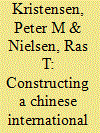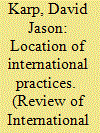| Srl | Item |
| 1 |
ID:
124406


|
|
|
|
|
| Publication |
2013.
|
| Summary/Abstract |
Chinese scholars are debating whether, and how, to innovate a Chinese theory of International Relations (IR). This article examines the driving forces behind this theoretical debate. It challenges the commonsensical link between external events in the subject matter (i.r.) and theorizing (IR), which suggests that the innovation of a Chinese IR theory is a natural product of China's geopolitical rise, its growing political ambitions, and discontent with Western hegemony. We propose instead a sociological approach to intellectual innovation which opens the black box of knowledge production, and argue that theoretical innovation, in China and elsewhere, is best understood as an interplay between internal and external layers. The internal academic context comprises intellectuals pursuing prominence, with each intellectual trying to carve out a maximally distinct position in order to receive attention from their peers-theorizing a Chinese IR theory being one important way of doing this. The external layer-which ranges from power politics to sociopolitical developments-affects this process indirectly by providing more research funds and autonomy to the more immediate institutional environment where control over rewards such as research funds, promotion, and publications affects what kind of work is done, with theorizing being increasingly rewarded.
|
|
|
|
|
|
|
|
|
|
|
|
|
|
|
|
| 2 |
ID:
123398


|
|
|
|
|
| Publication |
2013.
|
| Summary/Abstract |
This article opens up space to challenge state-centrism about human rights practice. To do so, it presents and critically assesses four methods that can be used to determine who and/or what counts as a part of any international practice: the agreement method, which locates a practice by referring to speech acts that define it; the contextual method, which locates a practice by referring to the actions, meanings, and intentions of practitioners; the value method, which locates a practice by identifying a value or principle that the practice reflects or instantiates; and the purpose method, which locates a practice by constructing an account of the sociopolitical reason(s) for a practice's existence. The purpose method, based on an interpretation of Rawls' constructivism, is developed, in a way that focuses on practitioners' judgement-based reasons to assign responsibility for human rights to any state or non-state actor.
|
|
|
|
|
|
|
|
|
|
|
|
|
|
|
|